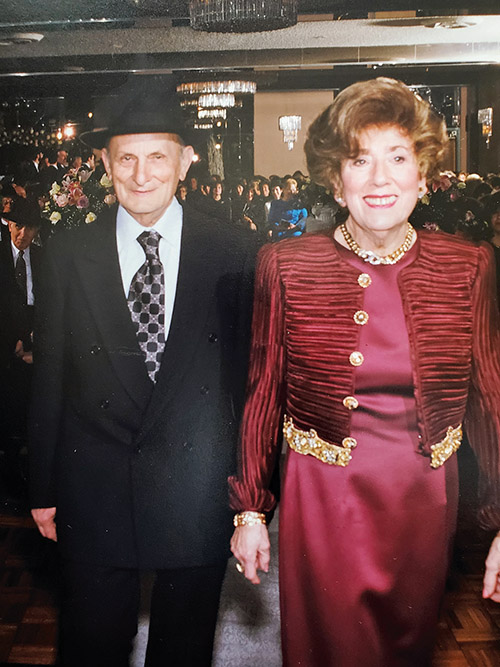
Last week, sixth graders from Ben Porat Yosef, Lubavitch on the Palisades, RYNJ, Yavneh Academy, Yeshivat He’Atid, Yeshivat Noam and The Moriah School were privileged to participate in a virtual Yom HaShoah program led by Susan Dworken Koss, a renowned educator, community member and proud grandparent of middle schoolers from a few of the participating yeshivot. Rabbi Daniel Price, head of school at RYNJ, opened the program with the recitation of two chapters in Tehillim, dedicated to the many people in our community who are in need of a refuah sheleima.
Dworken Koss took the students on a journey into the past as she introduced two important heroes of the Holocaust, Edith Hoffman and Joseph Haberman. She urged the students, as they listened to the story unfold, to keep in mind that these two heroes were just kids themselves when their lives were overturned by the horrific events of the Shoah.
As she spoke, she displayed pictures of Edith and Joseph and their families so the students could visualize them in a way that truly brought them to life.
Edith was born in Hungary and lived a happy childhood, “similar to the life many of you lead today,” Dworken Koss told the students. She had friends, attended school and even had a bat mitzvah celebration. All of that changed when the Nazis came to power. Harsh restrictions were imposed on Jews and life as they knew it was taken away.
Edith, whose mother died when she was 16, lived with her father and her sister. In 1944, the Nazis took her father away and she never saw him again. Together with her sister, they struggled to survive, doing whatever they could to avoid being sent to the death camp.
Edith and her sister were moved to the ghetto in Budapest, where they lived for a few months until they heard the Nazis were planning to gather the Jews and send them to Auschwitz. They escaped the ghetto and were hidden by the superintendent of the building they lived in as children in Budapest. During that time, they obtained false papers from Raul Wallenberg that identified them as gentiles and allowed them to work at a large laundromat with many other Jewish girls pretending to be gentiles. One day, a German soldier called Edith out, accusing her of being Jewish. Understanding this was a life and death situation, Edith began to scream and fight back, believing it was her only chance for survival. Fortunately, the soldier backed away and warned he would review the situation the following day. To Edith’s relief, he forgot about her and she was safe.
This was but one of many instances throughout the Shoah when Edith was on the brink of death. Her courageousness and unending faith continued to carry her through the terrible experiences she endured. In 1945 she was liberated by the Russians and remained in Budapest with her sister.
Meanwhile, in a far-away place called Munkatch lived a young man by the name of Joseph Haberman. Unlike Edith, Joseph grew up in a large family with little means. At the time, young, able-bodied boys were being drafted to work in labor camps and Joseph was among those chosen. Joseph’s father was pleased that he was chosen to go to the labor camp, thinking his son would have a better chance of surviving the war.
As time passed, Joseph realized things would soon get worse and together with a friend he escaped the labor camp. They stumbled upon a righteous gentile who offered to hide them and give them food. This continued for about two weeks until he no longer showed up. Perplexed, Joseph decided to risk his safety and come out of hiding to see for himself what was happening. To his surprise, there was no one to be seen or heard. He began to walk and
ultimately stumbled upon the Russian army. He realized he was now liberated.
Joseph returned home to Munkatch only to discover his family was no longer there. He met an old friend who sadly informed him that they had all died in Auschwitz, except one brother and sister who went to Budapest. Anxious to reunite with his only living siblings, Joseph went to Budapest and found them.
“Now that the war was over they could have been downtrodden and given up on their beliefs,” said Dworken Koss. “They didn’t, instead they regained their strength and their lives.”
Edith and Joseph eventually met one another and married. Together they built a new life, filled with Torah and a love of Hashem. Their story is one of survival and emunah. When things seemed hopeless they didn’t give in to despair.
At the very end of the story, Dworken Koss revealed to the students that the two heroes she had spoken of were her beloved parents. “I share this story with you today because it is my story,” she explained. Each one of us has a story, said Dworken Koss, who tasked the students with an important assignment. “Talk to your parents and grandparents and ask about the past, and then make it your own.” If you identify with the people you learn about, you will never forget what happened to them, she added.
Dworken Koss concluded with a message that speaks to all Jews young and old. “Don’t grow tired of hearing about the Holocaust and remembering it,” she said. “It is our responsibility as Jews to perpetuate the memory of the Holocaust so that it never happens again.”
By Andrea Nissel













